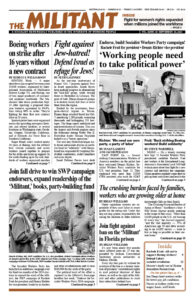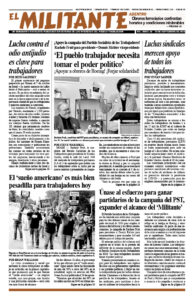“The economic war” waged by the U.S. government “is the main cause of the hardships facing the Cuban people, and the country’s economy,” Cuban Foreign Minister Bruno Rodríguez said in a special media presentation in Havana Sept. 12.
Rodríguez detailed the damages and material losses resulting from the impact of the economic, financial and trade embargo and from multiple sanctions imposed by the U.S. rulers against the Cuban people and their socialist revolution. From March 1, 2023, to Feb. 29, 2024, Washington’s measures caused estimated losses of more than $5 billion. “This represents more than $421 million a month, more than $13.8 million a day, more than $575,638 for each hour of the blockade,” he said.
“This is an economic war, not in rhetorical or propagandistic terms,” he explained. “It is really an economic war!”
The facts described by Rodríguez will be presented at the next session of the United Nations General Assembly Oct. 29-30, where the Cuban delegation will move a resolution demanding an end to Washington’s embargo.
For more than 60 years, Cuba has been the target of a relentless effort by the U.S. government that has no parallel. For decades, Washington has sought to overthrow the workers and farmers government that came to power after a popular revolutionary struggle overthrew the U.S.-backed dictatorship of Fulgencio Batista Jan. 1, 1959. The U.S. rulers fear that tens of millions of workers around the world, facing brutal conditions imposed by capitalism, might emulate what the Cuban toilers and their leadership showed is possible.
The centerpiece of Washington’s drive to destroy the socialist revolution — enforced by both Democratic and Republican administrations — includes sweeping measures that impose countless obstacles to Cuba’s ability to purchase foodstuffs, medicine, medical supplies and equipment from the U.S. and other countries.
In 2021, the Donald Trump administration placed Cuba on Washington’s “State Sponsors of Terrorism” list, which imposes additional sanctions that restrict access to financing from foreign banks and institutions, and even general services and transactions. The Joseph Biden administration has refused to back off these measures.
Impact of U.S. embargo, sanctions
Between January 2021 and February 2024 foreign banks refused to process some 1,064 transactions with Cuban banks and institutions, Rodríguez said. “We have had ships about to enter our territorial waters or in port with essential foodstuffs that have refused to unload until the payments are completed.” This is despite the fact that the Cuban government has deposited the money in foreign banks. The banks can’t process the transactions because of Washington’s inclusion of Cuba in its so-called terrorist list, he said.
All this contributes to the lack of raw materials for production, fuel and parts for the country’s electrical system, and to the scarcity of some medications, despite Cuba having a relatively well-developed biomedical and pharmaceutical industry.
“Cuba should have never been included in that shameful list,” Rodríguez said. To the contrary, our country “is a victim of state terrorism from the U.S. government, and of violent terrorist actions organized from U.S. soil with impunity.”
In the report, Rodríguez gave graphic examples of the damage caused by Washington’s measures on daily life. The losses to the Cuban economy due to the embargo in 25 days ($339 million) would be enough to cover the basic supply of medicines for one year. The losses caused in 21 hours ($12 million) is equal to the cost of purchasing a one-year supply of insulin for the entire country. Fifteen minutes would fund the supply of hearing aids for children and adolescents with disabilities ($144,000).
The lack of foreign currency for fuel has caused regular electricity outages, and has a cumulative effect on the country’s infrastructure. According to press reports, more than 600,000 people are affected by water supply disruptions, often caused by a lack of pipes and pumps. Even water supply by truck has been limited due to shortages of fuel and equipment, according to Cuban officials.
Of course, the difficulties Cuban society is confronting are not due exclusively to the embargo, said Rodríguez. “There are errors in the management of the economy, but they are unintended, and they hurt.” But the heart of the problem is the U.S. rulers’ deliberate plan to cause “pain and humanitarian damage to people.”
“Our government and people work very hard to overcome the hardships caused by the blockade,” he said. In this, the creativity and participation of the Cuban people, and the determination of the immense majority to defend the country’s independence and socialism, play a decisive role, the Cuban leader said.
More facts about the impact of Washington’s economic war are available at https://cubaminrex.cu/sites/default/files/2024-09/InformeB2024en.pdf
The report helps arm opponents of Washington’s embargo in the U.S. and elsewhere to reach out to win wider support for the demand for its immediate and unconditional end.

